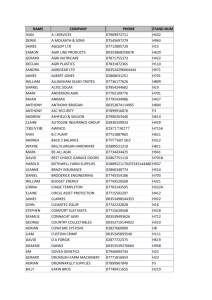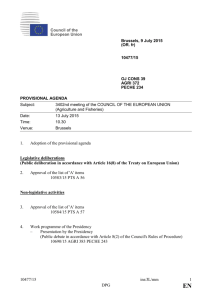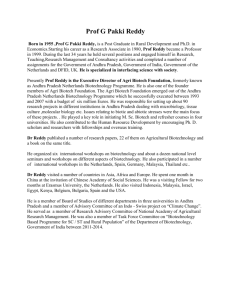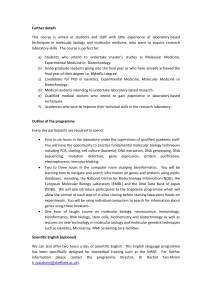MSc Plant Biotechnology - A513
advertisement
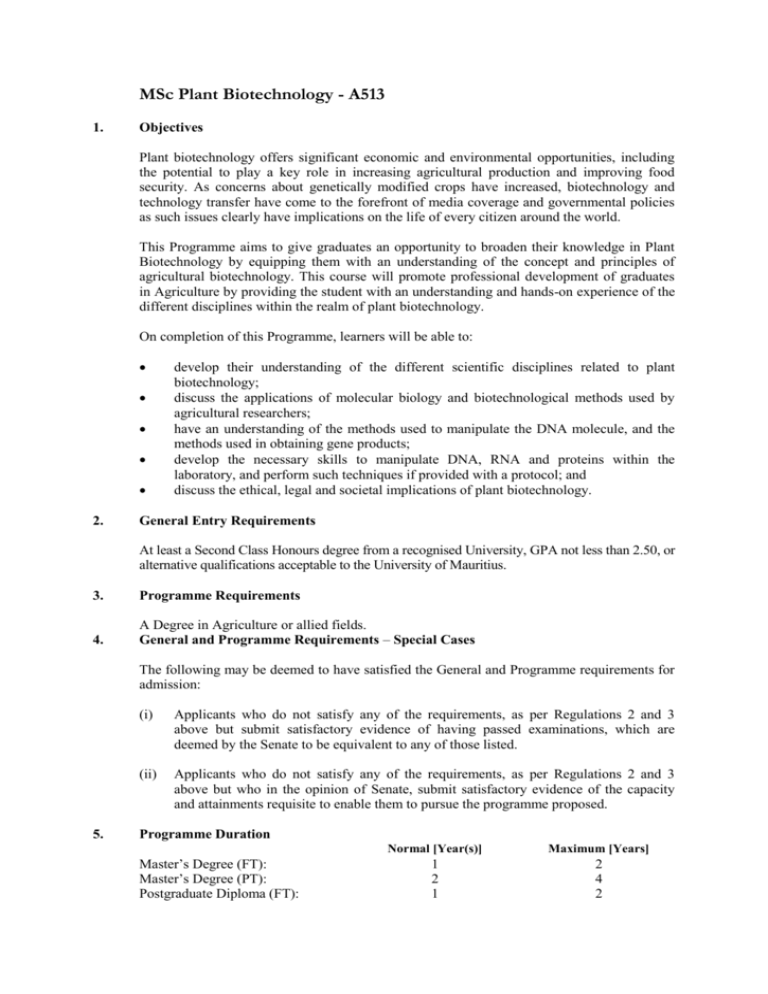
MSc Plant Biotechnology - A513 1. Objectives Plant biotechnology offers significant economic and environmental opportunities, including the potential to play a key role in increasing agricultural production and improving food security. As concerns about genetically modified crops have increased, biotechnology and technology transfer have come to the forefront of media coverage and governmental policies as such issues clearly have implications on the life of every citizen around the world. This Programme aims to give graduates an opportunity to broaden their knowledge in Plant Biotechnology by equipping them with an understanding of the concept and principles of agricultural biotechnology. This course will promote professional development of graduates in Agriculture by providing the student with an understanding and hands-on experience of the different disciplines within the realm of plant biotechnology. On completion of this Programme, learners will be able to: 2. develop their understanding of the different scientific disciplines related to plant biotechnology; discuss the applications of molecular biology and biotechnological methods used by agricultural researchers; have an understanding of the methods used to manipulate the DNA molecule, and the methods used in obtaining gene products; develop the necessary skills to manipulate DNA, RNA and proteins within the laboratory, and perform such techniques if provided with a protocol; and discuss the ethical, legal and societal implications of plant biotechnology. General Entry Requirements At least a Second Class Honours degree from a recognised University, GPA not less than 2.50, or alternative qualifications acceptable to the University of Mauritius. 3. Programme Requirements 4. A Degree in Agriculture or allied fields. General and Programme Requirements – Special Cases The following may be deemed to have satisfied the General and Programme requirements for admission: 5. (i) Applicants who do not satisfy any of the requirements, as per Regulations 2 and 3 above but submit satisfactory evidence of having passed examinations, which are deemed by the Senate to be equivalent to any of those listed. (ii) Applicants who do not satisfy any of the requirements, as per Regulations 2 and 3 above but who in the opinion of Senate, submit satisfactory evidence of the capacity and attainments requisite to enable them to pursue the programme proposed. Programme Duration Master’s Degree (FT): Master’s Degree (PT): Postgraduate Diploma (FT): Normal [Year(s)] Maximum [Years] 1 2 1 2 4 2 Postgraduate Diploma (PT): 2 4 6. Credits per Year: Minimum 12 credits subject to regulation 5. 7. Minimum Credits Required for the Award of Master’s Degree: 36 Postgraduate Diploma: 24 Breakdown as follows: Master’s Degree: 8. Core Taught Modules Project Electives 24 credits 12 credits - Assessment Each module will carry 100 marks and will be assessed as follows (unless otherwise specified): Assessment will be based on a written examination of 2-hour duration for 3-credit modules and 3-hour duration for 6-credit modules, carrying a weighting of 70%, and continuous assessment carrying 30% of total marks. Continuous assessment will be based on practical classes in and outside the laboratory, case studies, Problem-Based Learning, visits, studentled seminars, literature based research and/or assignments, and should include at least 1 class test. For a student to pass a module, a minimum of 30% should be attained in both the Continuous Assessment and Written Examination, with an overall total of a minimum of 40% in that module. Each module will carry 6 credits, except modules AGRI 6001Y(1), AGRI 6002Y(1) and the Project. Modules AGRI 6001Y(1) & AGRI 6002Y(1) will carry 3 credits and will be taught over one semester; the Project will carry 12 credits. There will be a compulsory class test for all modules taught over a semester at the end of the semester of the given academic year. Written examinations for all the modules, whether taught over one semester or one academic year, will be carried out at the end of the year. Submission Deadlines for Dissertation: 9. First Draft: End of July in the Final Year. Final Copy: Last working day of August in the Final Year. Important Note The rules as stipulated in this Programme Structure and Outline Syllabus will replace all other rules and regulations. 10. List of Modules Code Module Name Hrs/Yr L+P Credits CORE MODULES AGRI 6001Y(1) AGRI 6002Y(1) AGRI 6003Y(1) AGRI 6004Y(1) AGRI 6005Y(1) AGRI 6000Y(1) 11. Research Methods & Experimentation Advanced Molecular Biology Advanced Plant Science and Molecular Breeding Microbial Genetics and Genetic Engineering Advanced Plant Tissue Culture Project 30+30 45+0 75+30 3 3 6 75+30 75+30 - 6 6 12 Hrs/Yr L+P 30+30 45+0 75+30 Credits 75+30 75+30 - 6 6 12 Hrs/Yr L+P 30+30 45+0 75+30 Credits Hrs/Yr L+P 75+30 Credits 75+30 - 6 12 Programme Plan - MSc Plant Biotechnology Full-Time: YEAR 1 Code Module Name AGRI 6001Y(1) AGRI 6002Y(1) AGRI 6003Y(1) Research Methods & Experimentation Advanced Molecular Biology Advanced Plant Science and Molecular Breeding Microbial Genetics and Genetic Engineering Advanced Plant Tissue Culture Project AGRI 6004Y(1) AGRI 6005Y(1) AGRI 6000Y(1) 3 3 6 Part-Time: YEAR 1 Code Module Name AGRI 6001Y(1) AGRI 6002Y(1) AGRI 6005Y(1) Research Methods & Experimentation Advanced Molecular Biology Advanced Plant Tissue Culture 3 3 6 YEAR 2 Code Module Name AGRI 6003Y(1) Advanced Plant Science and Molecular Breeding Microbial Genetics and Genetic Engineering Project AGRI 6004Y(1) AGRI 6000Y(1) 6 Total: 36 credits 12. Outline Syllabus AGRI 6000Y(1) - PROJECT The project provides an opportunity for the students to undertake and contribute to a piece of original research work, in an area related to plant biotechnology. The students are required to design an experiment (or investigation, survey or other means) to test a hypothesis or proposition, to plan and execute the research work, to evaluate the outcomes and draw valid conclusions. The research work is carried out individually, under guided supervision. To support the project work, the Faculty has prepared a document on: Project Guidelines for MSc Degree. AGRI 6001Y(1) - RESEARCH METHODS & EXPERIMENTATION Methods of research and experimentation in Agriculture. Data Collection and Organisation. Experimental design and data analysis in crop production. Regression models and analysis. Use of statistical software for data processing. Principle component analysis. Survey Methodology and Scientific Communication. AGRI 6002Y(1) - ADVANCED MOLECULAR BIOLOGY Gene structure and organisation. Expression and transmission of genetic information. Control of gene expression. Basic immunology. Monoclonal antibodies, serodiagnostics and vaccines. AGRI 6003Y(1) - ADVANCED PLANT SCIENCE AND MOLECULAR BREEDING Plant mineral nutrition. Assimilation of inorganic nutrients. Transport phenomena in plant. Seed physiology and plant reproduction. Plant development and plant growth analysis. Molecular and Biotechnological methods of pest management. Genomics and characterisation of whole genomes; genetic mapping techniques; mutations and their consequences on phenotypes; Traditional and modern plant breeding techniques; Biometrical genetics; Quantitative trait loci; Genetic variation and molecular biology underlying key traits; maintenance, selection and use of germplasm resources; biochemical and molecular techniques used in breeding program. AGRI 6004Y(1) - MICROBIAL GENETICS AND GENETIC ENGINEERING Plant/pathogen interactions. Application of molecular biology in disease detection and characterisation of pests and pathogens. Plant virology. Principle of gene cloning. Recent developments in genetic engineering. Manipulating plant genomes, methods of plant cell transformation, Designer Genes and Transformation Technologies. Transgenic plants crop improvement. An overview of ethical controversies about biotechnology and specific ethical issues in plant, animal, and human biotechnology. Regulatory and ethical aspects of genetics: eugenics, genetic testing and screening, genetically modified organisms (GMOs), GMO Act (2004), legal protection and intellectual property rights, recombinant DNA and biosafety. Commercialisation of Transgenic Plants including field trials and release of transgenic crops; regulations, consumer acceptance and commercial aspects (intellectual property and use of patents). AGRI 6005Y(1) - ADVANCED PLANT TISSUE CULTURE Micropropagation techniques in horticulture and crop improvement; Protoplast and haploid cultures; Somatic and cytoplasmic hybridization; Genetic manipulation of crop plants; Secondary product synthesis by plant tissue cultures; Elicitation and immobilization techniques; Development and use of cell lines for specific purposes; Mutagenesis and selection in vitro; Commercial and technical perspectives.

